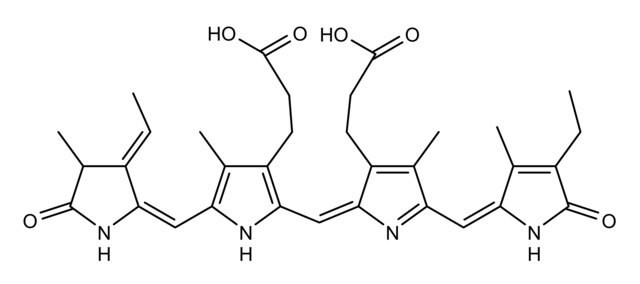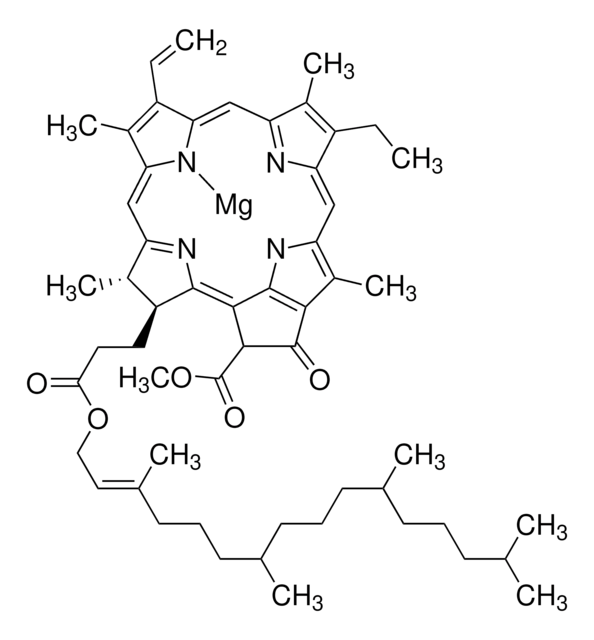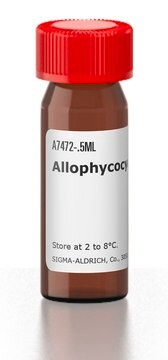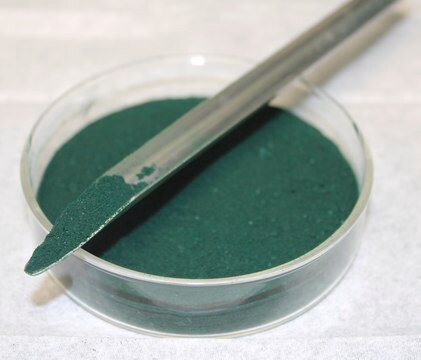About This Item
Código UNSPSC:
12352108
NACRES:
NA.32
Produtos recomendados
concentração
≥10.0 mg/mL (UV)
Nível de qualidade
técnica(s)
electrophoresis: suitable
fluorescência
λex 609 nm; λem 643 nm in 0.1 M phosphate pH 7.2
adequação
in accordance for gel electrophoresis
temperatura de armazenamento
2-8°C
Descrição geral
The product is suspended in 150 mM sodium phosphate, 60% ammonium sulfate, 1 mM EDTA, 1 mM sodium azide, pH 7.0 and must be dialyzed against conjugation buffer or PBS before conjugation.
Aplicação
C-Phycocyanin (CPC), a pigment-protein complex from the light-harvesting phycobiliprotein family, may be used in immunoassay kit development and to study its properties as a light harvesting protein.
Embalagem
Bottomless glass bottle. Contents are inside inserted fused cone.
Nota de análise
A620/A280 >3.5, A651/A620 <0.3
Código de classe de armazenamento
10 - Combustible liquids
Classe de risco de água (WGK)
WGK 3
Ponto de fulgor (°F)
Not applicable
Ponto de fulgor (°C)
Not applicable
Equipamento de proteção individual
Faceshields, Gloves, Goggles
Escolha uma das versões mais recentes:
Já possui este produto?
Encontre a documentação dos produtos que você adquiriu recentemente na biblioteca de documentos.
H Scheer et al.
Molecular microbiology, 68(2), 263-276 (2008-02-21)
Biliproteins are a widespread group of brilliantly coloured photoreceptors characterized by linear tetrapyrrolic chromophores, bilins, which are covalently bound to the apoproteins via relatively stable thioether bonds. Covalent binding stabilizes the chromoproteins and is mandatory for phycobilisome assembly; and, it
Jordan M Womick et al.
The journal of physical chemistry. B, 113(48), 15771-15782 (2009-11-12)
The electronic structure and photoinduced relaxation dynamics of the cyanobacterial light harvesting protein, C-Phycocyanin (CPC), are examined using transient grating and two-dimensional (2D) photon echo spectroscopies possessing sub-20 fs time resolution. In combination with linear absorption and fluorescence measurements, these
Michaela Kupka et al.
Biochimica et biophysica acta, 1777(1), 94-103 (2007-11-27)
Optical spectroscopic properties of the covalently linked chromophores of biliproteins are profoundly influenced by the state of the protein. This has been used to monitor the urea-induced denaturation of C-phycocyanin (CPC) from Mastigocladus laminosus and its subunits. Under equilibrium conditions
Lijin Tian et al.
The journal of physical chemistry. B, 117(38), 11000-11006 (2012-12-18)
Cyanobacteria are oxygen-evolving photosynthetic organisms that harvest sunlight and convert excitation energy into chemical energy. Most of the light is absorbed by large light harvesting complexes called phycobilisomes (PBs). In high-light conditions, cyanobacteria switch on a photoprotective mechanism called non-photochemical
Rasiah Pratheepa Kumari et al.
Biological trace element research, 151(1), 59-67 (2012-10-23)
The present investigation is aimed to evaluate the anticataractogenic potential of C-phycocyanin (C-PC), extracted and purified from Spirulina platensis. Enucleated rat lenses were maintained in vitro in Dulbecco's modified Eagle medium (DMEM). Group I contained DMEM, Group II and Group
Nossa equipe de cientistas tem experiência em todas as áreas de pesquisa, incluindo Life Sciences, ciência de materiais, síntese química, cromatografia, química analítica e muitas outras.
Entre em contato com a assistência técnica






